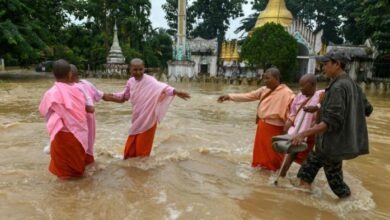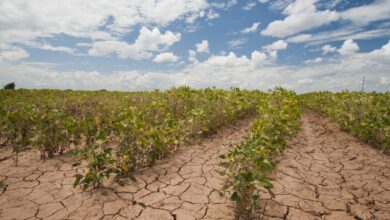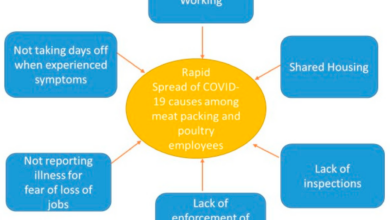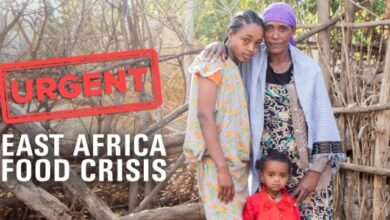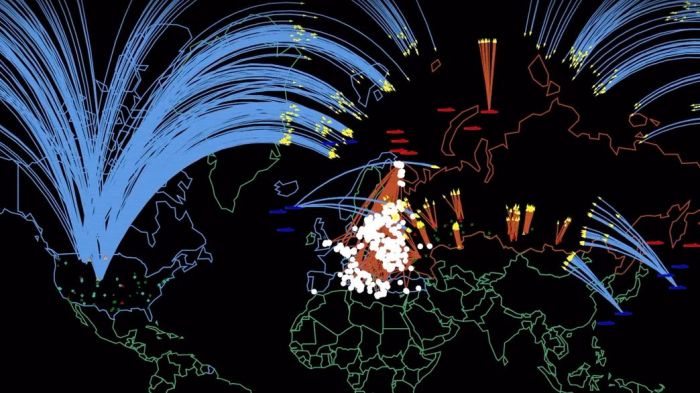
A Large Nuclear War Could Leave 5 Billion People Without Enough to Eat
A large nuclear war could leave 5 billion people without enough to eat, a chilling reality that paints a grim picture of a world ravaged by conflict. The devastating consequences of such a war extend far beyond the immediate destruction, impacting the very foundation of our food supply chain and leaving billions facing starvation.
The fallout from nuclear weapons would contaminate soil and water resources, rendering them unfit for agriculture, while the destruction of infrastructure and transportation networks would cripple our ability to produce, store, and distribute food. The ripple effects of this catastrophic event would be felt globally, pushing the world into a state of unprecedented food insecurity.
Imagine a world where the familiar act of putting food on the table becomes a desperate struggle for survival. This is the stark reality that awaits us if we fail to prevent a large-scale nuclear war. The impact would be felt most acutely by vulnerable populations, including children, the elderly, and refugees, who are already struggling to access adequate food.
The consequences would be catastrophic, leading to widespread famine, malnutrition, and disease outbreaks. The world would be plunged into chaos and despair, with the very fabric of society threatened by the scarcity of basic necessities.
The Devastation of Nuclear War
A large-scale nuclear war would have catastrophic consequences for global agriculture, leading to widespread food shortages and famine. The immediate and long-term effects of nuclear explosions would disrupt food production and distribution systems, leaving billions of people without enough to eat.
Disruption of Food Production Systems
The immediate effects of nuclear explosions on agriculture would be devastating. Nuclear blasts would create shock waves and intense heat that would incinerate crops and livestock in the immediate vicinity. The fallout from nuclear explosions would contaminate the soil and water resources, rendering them unsuitable for agriculture.
- Radiation Contamination:Nuclear fallout contains radioactive isotopes that can contaminate soil and water, making them unsafe for growing crops and raising livestock. The radiation can damage plant DNA, leading to stunted growth, reduced yields, and increased susceptibility to diseases.
- Soil Degradation:Nuclear fallout can also degrade soil fertility by altering its chemical composition and microbial activity. The radiation can kill beneficial microorganisms in the soil, reducing its ability to retain nutrients and water.
- Water Contamination:Nuclear fallout can contaminate water sources, making them unsafe for drinking and irrigation. Radioactive isotopes can accumulate in water bodies, posing a health risk to humans and animals.
Food Supply Chain Disruptions
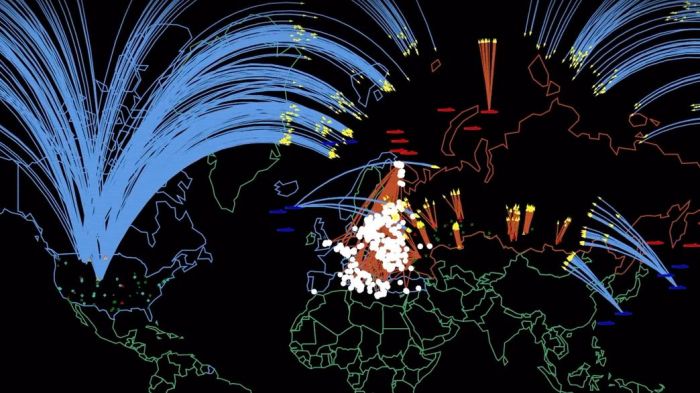
A nuclear war would devastate the global food supply chain, leaving billions without adequate nourishment. The interconnected nature of the modern food system, relying on complex networks of transportation, storage, and processing, makes it extremely vulnerable to disruptions caused by nuclear conflict.
Transportation Disruptions
The transportation of food is a critical link in the global food supply chain. Nuclear war would severely disrupt transportation networks, impacting the movement of food from farms to consumers.
Infrastructure Damage
Nuclear explosions and fallout could destroy roads, bridges, railways, and ports, rendering them unusable for transportation.
Fuel Shortages
The production and distribution of fuel, essential for transportation, would be severely disrupted, leading to a shortage of fuel for vehicles and machinery.
It’s chilling to think that a large nuclear war could leave 5 billion people without enough to eat. The sheer scale of such a disaster is unimaginable, and it’s a reminder of the fragility of our world. We need to work towards preventing such a catastrophe, and that includes addressing the immediate challenges we face, like the transportation disruptions plaguing air travel, as Transportation Secretary Pete Buttigieg recently pointed out to airlines in a recent statement.
These disruptions might seem small in comparison, but they highlight the need for effective planning and coordination, which are essential for navigating any crisis, including a potential nuclear war.
Safety Concerns
The thought of a large nuclear war leaving 5 billion people without enough to eat is terrifying, but it’s a reality we must consider. In the face of such a crisis, we need innovative solutions to keep essential services running.
The NHS is taking a step in the right direction by using drones to fly blood samples around London to avoid traffic in a new trial, as reported here. This kind of forward-thinking approach could be crucial in a post-nuclear world, where maintaining vital medical services will be paramount.
The threat of radiation and the presence of radioactive material would make it dangerous for drivers and transportation workers to operate in affected areas.
Storage and Processing Disruptions
Nuclear war would disrupt the storage and processing of food, further exacerbating food shortages.
Power Outages
Nuclear explosions could damage power grids, leading to widespread power outages that would disrupt refrigeration and other food processing operations.
Storage Facility Damage
Nuclear explosions and fallout could damage storage facilities, leading to the loss of food reserves.
Processing Plant Disruptions
Food processing plants, reliant on electricity, fuel, and transportation, would be significantly impacted by nuclear war, leading to disruptions in food production.
Loss of Infrastructure and Labor
The loss of infrastructure and labor would further exacerbate food shortages.
It’s hard to wrap your head around the scale of devastation a large nuclear war would bring. The thought of 5 billion people struggling to find enough food is terrifying, and the reality is even more bleak. It’s like the entire world’s food supply chain is suddenly a broken ticketing system, like the one that ticketing system broken after oasis chaos executive of resale site says – only instead of a concert, it’s our very survival.
Imagine the chaos, the desperation, and the utter lack of control. It’s a stark reminder that even amidst the seemingly mundane issues of today, we must always remember the fragility of our world.
Agricultural Infrastructure Damage
Nuclear war could destroy farm equipment, irrigation systems, and other agricultural infrastructure, making it difficult to grow and harvest crops.
Loss of Skilled Labor
Nuclear war would lead to the loss of skilled labor, including farmers, agricultural workers, and food processing personnel, making it challenging to maintain food production and distribution.
Social and Economic Disruptions
The widespread devastation caused by nuclear war would lead to social and economic disruptions, making it difficult to rebuild food systems and address food shortages.
Global Food Security and Scarcity
The potential consequences of widespread food shortages on global food security are dire and far-reaching. A nuclear war would disrupt global food systems, leading to widespread food shortages, famine, malnutrition, and societal unrest. The devastation of such a conflict would have a cascading effect on agriculture, food production, and distribution, ultimately impacting the ability of nations to feed their populations.
The Potential for Famine and Malnutrition
Food shortages would lead to widespread famine and malnutrition, particularly in vulnerable populations. The lack of access to adequate nutrition would weaken immune systems, making individuals more susceptible to diseases. Malnutrition, especially among children, could lead to stunted growth, developmental delays, and increased mortality rates.
Societal Unrest and Conflict, A large nuclear war could leave 5 billion people without enough to eat
Food shortages and famine can trigger societal unrest and conflict. Competition for scarce resources would intensify, leading to social unrest, riots, and even armed conflict. History provides numerous examples of how food shortages have fueled social upheaval and political instability.
Historical Perspective on Food Availability
Throughout history, conflicts have had a devastating impact on food availability. For example, the Rwandan genocide in 1994 resulted in widespread food shortages and famine. The Syrian Civil War, which began in 2011, has led to a severe food crisis, with millions facing starvation.
These examples highlight the profound impact that conflicts can have on food security and the devastating consequences of widespread food shortages.
The Impact on Vulnerable Populations
The devastating consequences of nuclear war would disproportionately affect the most vulnerable members of society, exacerbating existing inequalities and creating a humanitarian crisis of unprecedented scale. Food shortages, coupled with the breakdown of essential infrastructure and social systems, would leave millions at risk of starvation, disease, and displacement.
The Disproportionate Impact on Vulnerable Populations
The impact of food shortages would be felt most acutely by those who are already marginalized and lack access to resources. Children, the elderly, and refugees would be particularly vulnerable due to their dependence on others for food, water, and shelter.
Children, with their rapidly developing bodies, require a constant supply of nutrients for growth and development. The elderly, often facing pre-existing health conditions, are more susceptible to malnutrition and its associated complications. Refugees, displaced from their homes and stripped of their livelihoods, would be left with limited options for survival.
Increased Mortality Rates and Disease Outbreaks
Malnutrition weakens the immune system, making individuals more susceptible to infectious diseases. The collapse of healthcare systems in the aftermath of a nuclear war would further exacerbate the situation, leading to widespread outbreaks of preventable diseases. This would result in a surge in mortality rates, particularly among vulnerable populations who lack access to medical care and essential medications.
Ethical Implications of Resource Scarcity
The scarcity of resources in a post-nuclear war scenario would raise profound ethical questions. The limited food supply would force societies to make difficult choices about who receives access to essential resources. The potential for conflict and violence over dwindling resources would further complicate the humanitarian crisis.
Potential Mitigation Strategies: A Large Nuclear War Could Leave 5 Billion People Without Enough To Eat
The grim reality of a nuclear war underscores the urgent need for proactive strategies to mitigate the devastating consequences, particularly the widespread food shortages that would inevitably follow. While a nuclear war would leave an indelible mark on the planet, there are steps that can be taken to bolster resilience and increase the chances of survival.
A multi-faceted approach, combining international cooperation, strategic food reserves, and sustainable agricultural practices, holds the key to mitigating the catastrophic effects of such a conflict.
International Cooperation
International cooperation is paramount in the face of a nuclear war. The scale of the devastation would necessitate a coordinated global response, with nations pooling resources and expertise to address the immediate needs of affected populations. This collaboration should extend beyond immediate aid and encompass long-term recovery efforts, including the rebuilding of agricultural infrastructure and the restoration of food production.
A framework for international cooperation should be established in advance, outlining clear roles and responsibilities for each participating nation. This pre-emptive approach would ensure a more effective and timely response in the aftermath of a nuclear war.
Strategic Food Reserves
The establishment of strategic food reserves is crucial for mitigating the impact of food shortages. These reserves should consist of a diverse range of staple foods, including grains, legumes, and other essential nutrients, sufficient to sustain populations for an extended period.
Countries should consider the potential impact of nuclear war on their food production capacity and establish reserves accordingly. Furthermore, these reserves should be strategically located to ensure accessibility and distribution even in the face of widespread disruptions to transportation networks.
Regular assessments and replenishment of these reserves are essential to ensure their effectiveness.
Sustainable Agriculture Practices
The adoption of sustainable agricultural practices is critical for ensuring food security in the long term. These practices, which prioritize environmental conservation and resource efficiency, can enhance resilience to climate change and other environmental stressors, including the potential impacts of nuclear war.
Sustainable agriculture techniques, such as crop rotation, organic farming, and water conservation, can help to maintain soil fertility, reduce reliance on chemical inputs, and improve overall agricultural productivity. Promoting these practices can help to build a more resilient food system capable of withstanding the challenges posed by a nuclear conflict.
Hypothetical Scenario
Imagine a scenario where a limited nuclear exchange occurs, causing significant disruption to agricultural infrastructure and food supply chains. In this scenario, international cooperation would be essential for coordinating relief efforts and providing immediate aid to affected populations. Pre-existing agreements would facilitate the rapid deployment of food aid and medical supplies to areas in need.
Strategic food reserves would be crucial in bridging the gap until agricultural production can be restored. The reserves, strategically located and managed, would provide a vital lifeline for millions of people facing food shortages. Simultaneously, the international community would work to rebuild agricultural infrastructure, providing technical expertise and financial support to restore food production.
Sustainable agricultural practices would be prioritized in these reconstruction efforts, ensuring long-term food security and resilience.


